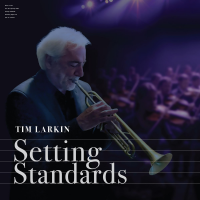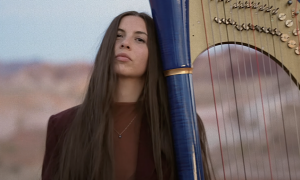Home » Jazz Articles » Interview » A Fireside Chat with Herbie Hancock
A Fireside Chat with Herbie Hancock
There is this music called electronica and a lot of the young artists rediscovered Sextant. I didn't even know that was happening.
All About Jazz: "Exploration leads to discovery" is the intro to your website. During your explorations, what have you discovered?
Herbie Hancock: One of the most important things is that what I am is not a musician. That's what I do. That's not what I am. What I am is a human being and what I do is play music.
AAJ: Rage against the machine.
HH: Most professional people define themselves by their job. Doctors define themselves by that. Artists, in general, do that. There is a tendency for people to do that. The problem with that is that first of all, it is not true. It is an inaccurate evaluation of self. It can lead into all kinds of problems. It can put blinders on you and make it difficult to recognize something that can be of value to you because you are just wearing that one hat. The other thing is, if something were to happen to make it impossible for you to perform whatever that function is, then there is a tendency for people to think that then their life has no meaning after that. It is quite the opposite.
AAJ: You have long championed the virtues of technology. But as advancements in technology have afforded a segment of the populous with an improved quality of life, technology has also left those less fortunate behind.
HH: Yeah, there are people and groups that are addressing those issues and fighting for those issues. One of the important things about everyone having access to the technology is that there is a tendency for people to think that the have nots are a charity case and they need help. There are individuals in the have nots group that could have very important ideas for our survival. You never know who the next great person is going to be, but if they don't have access to the technology, we won't have access to what they can bring to the table, which maybe something that we desperately need.
AAJ: Was it an irreversible lapse in public relations for the Recording Industry Association of America (RIAA) to sue a 12-year-old?
HH: Yeah, and I thought they represented the industry in general, meaning the artists and the record labels. I found out, in fact, they only represent the record labels. Although, they have been a proponent against the idea of stealing music that is supposed to be bought and paid for so that everyone who contributed their time and efforts can get paid. I think they were coming from the wrong place, first of all. They didn't really represent the artists. Some of the artists wouldn't go to Washington and fight that battle. I didn't and I told them I wouldn't because I don't think they're coming from the right place. The idea of biting off the hand that feeds you is not a good idea. It is the record companies' fault that the whole thing started in the first place because they were too self-absorbed and blind to the technology. Napster came in existence and then others after that.
AAJ: Can the recording industry stop the bleeding? The motion picture industry has a profitable satellite with DVDs.
HH: The motion picture industry is the next victim. The only thing that stands in the way of them being victims right now is the speed factor and storage. It takes too long to download a movie.
We know that that's going to change and going to change quickly. First of all, one thing that has happened with this whole business is that the business practices of the record labels have been exposed. That's a good thing. They have not been doing justice ever since CDs came out. They were supposed to change the price of CDs once they caught on, but they never did. I asked them for years why they charged so much for CDs and they always came up with some excuses that were bullshit. They have been ripping the public off for a long time.
AAJ: Do you approve of the hip-hop community sampling your work?
HH: We get paid for that. For example, Janet Jackson's new record has a sample from one of my records.
AAJ: Aside from Mongo Santamaria, who has justly interpreted your work?
HH: I don't look at it that way. If someone takes my tune and interprets it in a way that they see fit, I am happy about it.
AAJ: So you were pleased with Us3's "Cantaloop."
HH: Oh, yeah. When I first heard it, I was in Japan. I went to this club in Japan and I remember it was downstairs in some basement. As I am walking down the stairs, I hear "Cantaloupe Island," or so I thought. But I didn't hear the last two chords. I thought a DJ was mixing it with something else live and that somebody was rapping on top of it. Then it dawned on me that someone had told me that they did a rap version of "Cantaloupe Island." I thought it was pretty cool. I will give you another example, Fred. Years ago, what was her name? Lady. The song was called "Groove Is in the Heart."
AAJ: Deee-Lite.
HH: Deee-Lite, that's the group. I was told that somebody had sampled something from the Blow-Up soundtrack that I had done. I had never heard it. And then one day, my daughter and I were getting in my car and the radio was on and she said, "Dad, that's that song." She pointed it out because I didn't even remember the song. I had to go and get the record to remember.
AAJ: Would you revisit the Sextant band?
HH: There is this music called electronica and a lot of the young artists rediscovered Sextant. I didn't even know that was happening. Somebody had to point it out to me. I put a band together called Future 2 Future and we were in the electronica area. Sextant was a very raw sound and it grew out of the times. It was postavant-garde and the whole avant-garde area was a big underground thing happening in the '60s and had a lot of influence on the mainstream of jazz. For example, in the Miles Davis group I played in, I remember one concert that we played when I was with Miles and after the concert, Miles leaned over to Tony Williams and said, "I sounded like Don Cherry didn't I?" And he was pleased. Miles was pleased because he was checking it out too. So I haven't had to bring that band back as a reunion band. When I think of reunion bands, a lot of times, I think these are has beens trying to recreate something they did at a certain time and that time is not now.
AAJ: Of late, you have been on tour with Michael Brecker and Roy Hargrove (Directions in Music), celebrating the music of Miles Davis and John Coltrane.
HH: They were born the same year and so we were celebrating what would be their 75th birthdays. That was an idea that was generated by my concert agent. Miles has been a major innovator through several generations. That is kind of a no-brainer for people to realize that. For John Coltrane, during the time that he was with Miles and then particularly when he left Miles, he contributed a whole different kind of openness to the music and added a spiritual essence to the music scene. Not that Miles' music wasn't spiritual, but John's was in almost an hypnotic way. During the short time that he was around, because he wasn't around that long, he was a major contributor, especially to saxophone players. Michael Brecker, for example, credits John Coltrane for the reason that he plays saxophone. He wouldn't be a musician had it not been for John Coltrane's music.
AAJ: In June, you headline the Playboy Jazz Festival.
HH: That is a quartet with Wayne Shorter and Brian Blade and Dave Holland. We are looking forward to it.
AAJ: You are continuing your association with the Thelonious Monk Institute, of which you are a board member.
HH: Right, I am the Chairman now. The overall vision is the promotion of jazz and jazz education, and to grow a new audience for jazz, and also to work towards the continued evolution of the music. We have a lot of different programs going. One of them including jazz as a part of American history in elementary schools and middle schools because it should be. Any German knows who Beethoven is and Bach. Most of the people in Europe know who their great composers are without having to study music. They are included in the cultural aspect of the history their nations and we don't do that for jazz in nation and it really should be. We also have a performance area too. We have a college band selected from around the world. Every year, we put a band together and they are together for two years. Each year, the groups that we put together blow our minds in their growth and in their development. It is really amazing. The bands are so good they're scary.
AAJ: There is hope.
HH: Exactly.
Tags
PREVIOUS / NEXT
Herbie Hancock Concerts
Support All About Jazz
 All About Jazz has been a pillar of jazz since 1995, championing it as an art form and, more importantly, supporting the musicians who make it. Our enduring commitment has made "AAJ" one of the most culturally important websites of its kind, read by hundreds of thousands of fans, musicians and industry figures every month.
All About Jazz has been a pillar of jazz since 1995, championing it as an art form and, more importantly, supporting the musicians who make it. Our enduring commitment has made "AAJ" one of the most culturally important websites of its kind, read by hundreds of thousands of fans, musicians and industry figures every month.
























